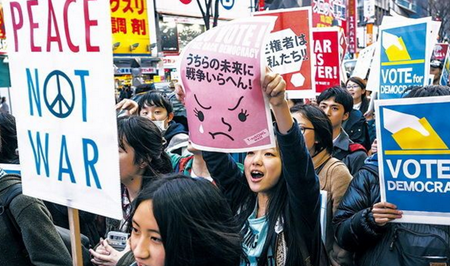By Zhou Yongsheng,Professor, doctoral tutor and deputy-director of Japan Research Center, Institute of International Relations, China Foreign Affairs University
Japan's new security laws have gone into effect on March 29, while China, the Democratic Republic of Korea (DPRK) and Russia are considered existing "threats" to Tokyo.

With excuses to cope with such threats and offering protections to the U.S., the new security laws were passed, but the question is how would the law get carried out and what does it aim for?
In order to win nationwide elections for Japan's Upper House in July and to avoid difficulties, Japanese Prime Minister Shinzo Abe may not rush to take action.
Nevertheless, as long as he wins approval by a two-third vote, he can launch an aggressive Constitution amendment that deletes Article 9 of the Constitution and would establish a National Defense Force to recognize the right of belligerency against another state.
Most Japanese do not agree to amend the Constitution, so Abe has to frighten people by exaggerating regional threats, such the South China Sea Region and the DPRK.
Abe hopes to introduce the new security laws. Tokyo's so-called "nationalization" of the Diaoyu islands in 2012 is a gross violation of China's sovereignty over its territory.
In response, the Chinese Navy had conducted patrols around the islands, which caused a difficult situation for Japan, who failed in its patrols.
Tokyo stands likely to make trouble in the Diaoyu Islands again in the second half of this year to create the right conditions for public support of the Constitution amendment.
The new security laws may be an opportunity for Tokyo to proclaim China's threat and to patrol with the US in support of its allies, which have territorial disputes with China.
Tokyo may take the dispute over the DPRK as an excuse to endorse the new laws. The strategy would receive support from South Korea and the US. Therefore, Pyongyang would become a target of Japan's new security laws.
By stirring up troubles and exaggerating opponents' threats, Abe expects to create a scary atmosphere to win public approval of a Constitution amendment. Let's wait and see what Abe will shoot at with his "sharp arrow."

Zhou Yongsheng,Professor, doctoral tutor and deputy-director of Japan Research Center, Institute of International Relations, China Foreign Affairs University
( The opinions expressed here do not necessarily reflect the opinions of Panview or CCTV.com. )

Panview offers an alternative angle on China and the rest of the world through the analyses and opinions of experts. We also welcome outside submissions, so feel free to send in your own editorials to "globalopinion@vip.cntv.cn" for consideration.















